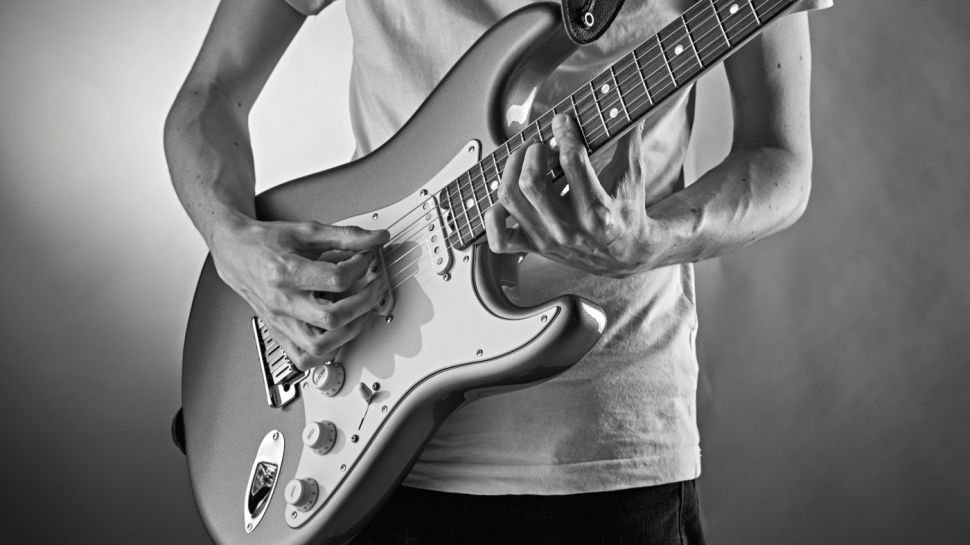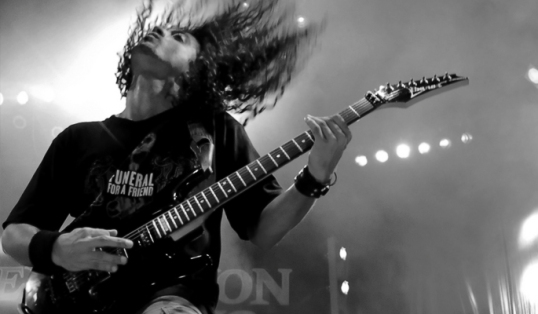I’m sure you’ve read or heard plenty of clichés when it comes to the subject of playing guitar fast, or learning to shred. When something is regurgitated and repeated so often, I begin to question its validity. Ask any guitarist (preferably one that can play fast) how to play fast and you’ll get the inevitable responses such as, ‘practice slow with a metronome’, ‘perfect practice makes perfect’, ‘don’t practice your mistakes’, and so on. While there’s some truth to every cliché, I think there’s a little more to it than meets the eye…
I’ll admit it, I can play faster than I probably need to. I’m not into shred guitar and have no desire to impress people with how fast my fingers can move up and down the fretboard. Perhaps I wanted to when I was younger, and this is understandable of course, but when you’re a young and naïve guitarist, you tend to go about achieving these things in the wrong, or most laborious, way.
You Will Get Faster
Let me tell you that just through the sheer inertia of playing the guitar for years on end, you will get faster. This is the best kind of speed because it’s your natural speed. It’s the first speed limit you hit when you learn something new, or when you inject a little pace into your solos. It’s basically the fastest you can play cleanly without screwing up.
Unnatural Practices
I’ll also admit that I never really use metronomes, but when I have applied the ‘practice slow with a metronome’ cliché, I would find it harder and somewhat counterproductive to play something exaggeratedly slowly. If you are a fan of metronomes and this type of practicing, I would recommend starting off on the slowest speed you’re comfortable at, or in other words, the slowest speed that it still feels natural to play at; otherwise, you’re almost practicing a new skill: slow motion guitar.
The Quality of the Repetition
Whenever I hear the cliché, ‘perfect practice makes perfect’, or something to that effect, I immediately think of the quality of the repetition. You’ll find that if you start to focus on the quality of the very thing you’re endlessly repeating, your technique will improve at a much faster rate. The reason for this is that you transform a mindless process into a mindful one by paying close attention to what you’re doing and self-correcting, or improving on the fly.
The Mechanical Approach
The Mechanical Approach consists of purely technical exercises, and is a little masochistic. For this kind of approach, you need a book like The Guitar Grimoire Exercise Book, which is page after page of very well thought out exercises to improve your technique. While this way of building speed is incredibly tedious, it will be faster than other methods in the long-run because its focus is on improving your natural speed i.e. it is non-specific.
The Non-Mechanical Approach
The non-mechanical approach on the other hand is probably the most used yet slowest way to learn to play fast. A lot of guitarists are into a fast player in particular and develop the overwhelming desire to play like their hero by learning their licks. While this is admirable, it’s also like shooting yourself in the foot as far as fast playing goes because you’ve just created ten times as much work for yourself. Learning to play fast via other fast players’ licks involves learning the nuances of their speed technique, the lick itself, the picking, the fingering, and so on. If you do manage to accomplish this feat, you have to start the process over when you take on another lick, even from the same player. As you can imagine, this kind of practice does little for your natural speed on guitar.
Economy of Movement
Right up there with the quality of the repetition is economy of movement. This means using the least amount of movements and energy possible to execute a lick or run. Study your fretting and picking hands carefully to see where you can economize movement. If your fingers tend to flap a lot and you don’t correct this via economy of movement, you will still get faster—only faster at flapping your fingers.
My Alternative Approach
I’m going to go out on a limb here and recommend that to improve your natural speed on guitar, what you need to practice are… your own licks, runs and improvisations. How? Isolate a couple of ‘nuance phrases’ that you always play when improvising and work on making those things faster. Why? It’s completely natural to you and your guitar-playing nuances—and this is what we want to speed up! It’s kind of the opposite of the non-mechanical approach because you never need to reverse engineer your own playing to be able to play faster. Consider the quality of the repetition and economy of movement when you do this, and you’ll see your technique get tighter in less than a week, I promise!



